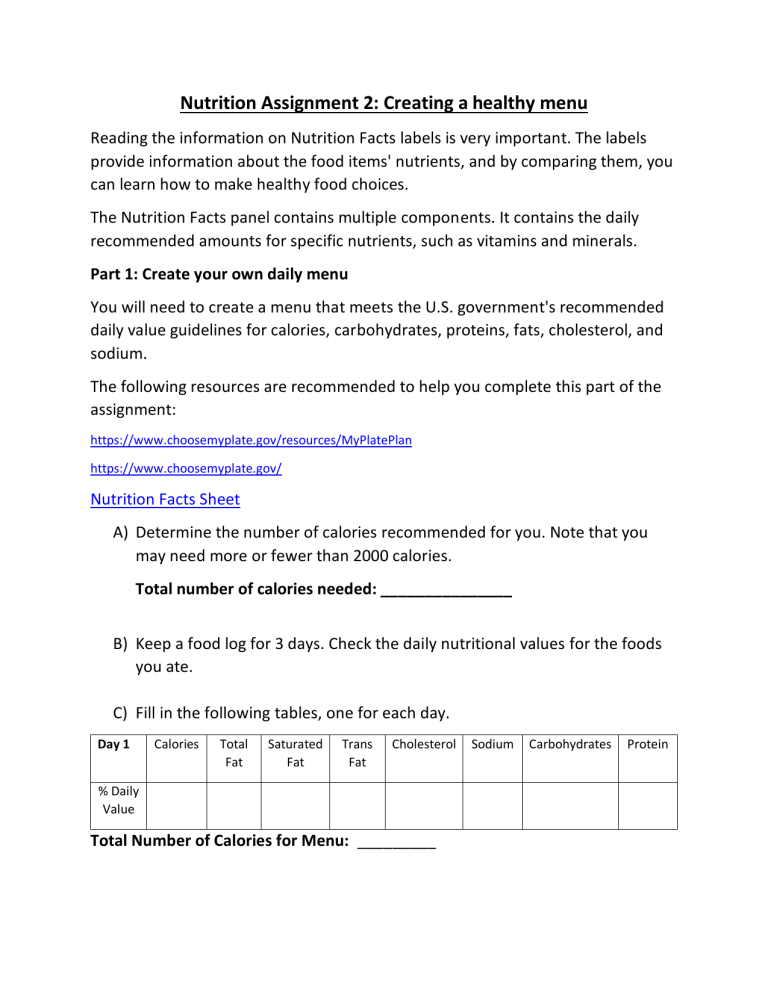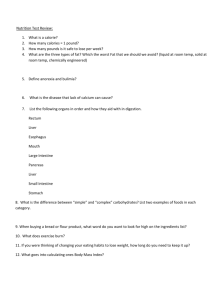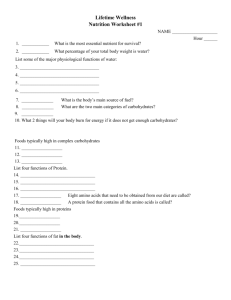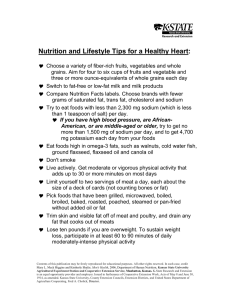
Nutrition Assignment 2: Creating a healthy menu Reading the information on Nutrition Facts labels is very important. The labels provide information about the food items' nutrients, and by comparing them, you can learn how to make healthy food choices. The Nutrition Facts panel contains multiple components. It contains the daily recommended amounts for specific nutrients, such as vitamins and minerals. Part 1: Create your own daily menu You will need to create a menu that meets the U.S. government's recommended daily value guidelines for calories, carbohydrates, proteins, fats, cholesterol, and sodium. The following resources are recommended to help you complete this part of the assignment: https://www.choosemyplate.gov/resources/MyPlatePlan https://www.choosemyplate.gov/ Nutrition Facts Sheet A) Determine the number of calories recommended for you. Note that you may need more or fewer than 2000 calories. Total number of calories needed: _______________ B) Keep a food log for 3 days. Check the daily nutritional values for the foods you ate. C) Fill in the following tables, one for each day. Day 1 Calories Total Fat Saturated Fat Trans Fat Cholesterol % Daily Value Total Number of Calories for Menu: _________ Sodium Carbohydrates Protein Day 2 Calories Total Fat Saturated Fat Trans Fat Cholesterol Sodium Carbohydrates Protein Sodium Carbohydrates Protein % Daily Value Total Number of Calories for Menu: _________ Day 3 Calories Total Fat Saturated Fat Trans Fat Cholesterol % Daily Value Total Number of Calories for Menu: _________ D) For one of the three days, complete the following table by filling in the foods you ate in the correct boxes. Day #_____ Mealtime Breakfast Snack Lunch Snack Dinner Grains Fruit Vegetables Protein Dairy Fats, oils and sweets Prepared Foods E) Answer the following questions based on your observations and what you have learned in this course. Please write in complete sentences. One or two words will not suffice. 1. Explain why the menu of food choices you made is nutritious, meaning the food choices follow the government's recommendations for calories and nutrients. 2. Do any of the items you selected provide more than 30% in any nutritional area? If so, which foods and which nutrients? Why did you choose those foods? 3. Did the menu you created contain the foods you like to eat? Explain why or why not. 4. How can you use the Nutrition Facts label to make healthy decisions? Part 2: Kelsey is a busy working mom. She is 28 years old and her lifestyle would be best described as "moderately active". Kelsey has eaten the following today: Breakfast: 1 serving plain cereal, 1 cup nonfat milk, 1 cup orange juice, 1 banana, 1 serving plain low-fat yogurt Snack: 1 pear, 2 chocolate chip cookies Lunch: 1 multigrain roll, 1 serving tuna in water, 2 cups shredded lettuce, 1 medium tomato, 1 serving cheddar cheese, 1 serving low-fat salad dressing Snack: 2 oz unsalted tortilla chips Dinner: 2 slices cheese pizza, 1 cup spinach, 1 cup diced pineapple, 2 pieces chocolate almond candy A) Fill out the following tables for Kelsey, using the Nutrition Facts sheet and the information above. Calories Total Fat Saturated Fat Trans Fat Cholesterol Sodium Carbohydrates Protein % Daily Value Total Number of Calories for Menu: _________ Mealtime Breakfast Snack Lunch Snack Dinner Grains Fruit Vegetables Protein Dairy Fats, oils and sweets Prepared Foods B) Please answer the following questions, using information from your observations, the Nutrition Facts sheet, your textbook and other resources. Please write in complete sentences. One or two words will not suffice. Be sure to cite your sources. 1. a. How many calories does Kelsey need daily? Should Kelsey be meeting the 2000 calorie diet? Why or why not? b. Explain why the menu of food choices Kelsey made is nutritious, meaning the food choices follow the government's recommendations for calories and nutrients. 2. What do you notice about the nutrients in fast foods and prepared foods? 3. How many calories per day does each of the following need? Active 2-year-old child Sedentary 12-year-old boy Moderately active 20-year-old female Sedentary 55-year-old male 4. List at least three pieces of information that are always presented on a product’s nutrition facts label. Briefly describe what that information tells the consumer. 5. List three factors that appear to affect the daily calorie requirement. Explain your answer. 6. a. List the following foods from healthiest in terms of fats content to least healthy. Show your work or explain. b. List the following foods from healthiest in terms of carbohydrates content to least healthy. Show your work or explain. Jiffy Oatmeal Crunch Easy Fruit Salad Orange Banana Frosty Sensational 6-Layer Dinner 7. List the following prepared foods from healthiest in terms of sodium content to least healthy. Show your work or explain. Tuna Sub Pepperoni Pizza Regular Cheeseburger Chicken Filet 8. Why does sodium appear on the nutrition facts label? 9. How much dietary fiber should one consume per day? What is the benefit of a high fiber diet? 10. Edward is looking to reduce his dietary related risk of heart disease. Which of the following foods is a healthy choice for his dietary lifestyle? Explain why. Nachos 0 grams fiber Pear 5 grams fiber Whole milk 0 grams fiber Apple pie 2 grams fiber Brown rice 3 grams fiber 11. The nutrition facts label of a product tells you that it provides 5% of your daily value for calcium. How many servings would you need to meet your daily recommendations for this nutrient? Show your work. 12. Which vitamins and minerals are shown on nutrition facts labels? What does the daily value of these micronutrients indicate?



